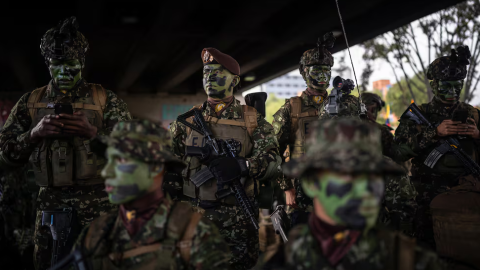
In a recent interview, Colombia's consul general in Mexico City confirmed that at least one active member of the Colombian armed forces is working with Mexican drug cartels, recruiting former military personnel to serve as mercenaries for criminal groups including the Sinaloa and Jalisco cartels.
Alfredo Molano Jimeno, a former journalist appointed to the post earlier this year following controversies involving his predecessor, told Milenio that at least one active-duty soldier is involved in the recruitment network.
"We've found that recruitment routes involve active-duty military personnel using fraudulent job offers. We have at least one name of an active member," Jimeno said. "What's clear is a pattern of involvement: members of the security forces have participated in recruitment efforts in the same areas where individuals were later abducted."
According to Jimeno, Colombian veterans are lured with promises of monthly salaries ranging from $2,500 to $10,000, depending on their skills and level of training.
"They spread these false job offers through WhatsApp groups, Facebook, and even platforms designed to collect résumés, posing as legitimate companies conducting formal recruitment processes," he said.
Earlier this year, Mexican media reported that cartels had launched a coordinated effort to recruit former and active Colombian soldiers. An investigation by Animal Político revealed that the Cártel Jalisco Nueva Generación (CJNG) was enlisting Colombian veterans to train and assist in the installation and production of explosives, particularly landmines, according to testimony from a former soldier.
The soldier, known by the alias "El Pascual," served six years in the Colombian military and was allegedly recruited in 2023 by the CJNG. He said he was initially offered work as a bodyguard and private escort in Mexico.
According to Animal Político, El Pascual was contacted by an active-duty Colombian soldier who offered him roughly $1,700 per month to work as a security guard in Mexico.
"I saw an ad online that said they would cover housing, personal, and travel expenses. It was a very attractive offer," he said. "I had all the qualifications they were looking for, and I was told that was enough to be hired."
Fernando García, Colombia's ambassador to Mexico, said the phenomenon is not new. Authorities have previously detected the involvement of Colombian veterans and active-duty soldiers in other international conflicts.
"We've seen similar cases, such as the attack in Haiti that resulted in the death of the Haitian prime minister," García told Milenio. "We've also identified the presence of around 300 former soldiers in Ukraine, and previously received reports of others participating in conflicts in Iraq and, I believe, Afghanistan."
Earlier this week, Mexico's Security Minister, Omar García Harfuch, said 12 Colombian nationals had been detained in the state of Michoacán in connection with a landmine explosion that killed six soldiers. Harfuch said the detainees had prior military training, and some admitted to being recruited by drug cartels.
🪖@OHarfuch informó que 12 ciudadanos colombianos fueron detenidos en Michoacán, vinculados con la explosión de una mina que mató a seis militares.
— Animal Político (@Pajaropolitico) June 10, 2025
Detalló que contaban con entrenamiento militar y algunos declararon haber sido reclutados por el crimen organizado. pic.twitter.com/Td5jzxtfDF
As part of its investigation, the Colombian government suspects that the Ministry of Foreign Affairs may have expedited passport issuance for those involved, enabling their travel to Mexico.
"We've noticed a pattern in the issuance of passports that could indicate coordinated recruitment efforts across different regions," Jimeno said.
Mexican government sources told Milenio that a separate investigation has also been launched into personnel at the National Immigration Institute (INM), amid suspicions that employees may have helped facilitate the entry of the detained Colombians into the country.
© 2025 Latin Times. All rights reserved. Do not reproduce without permission.







